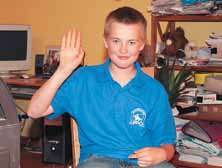Healing of behavioral disorder and lack of self-esteem
J. R. (14), Germany

Mrs. R. reports: “J. is my third child. My two daughters never exhibited behavioral problems. At the age of eighteen months my son began to bite me in the morning while I was still sleeping. He also bit other children. It was a way of making contact. He would throw building blocks at his grandfather. When J. didn't get his way he would throw himself on the floor, scream, cry, beat his head on the floor and try to hide somewhere. I was a single parent at the time and often unable to cope. Nothing would stop J. except for a slap on the face - for me the worst thing and a last resort.
Both good and bad sides
Later a lack of self-esteem came to the fore. When something didn't go well he would become profoundly desperate. He would then call himself an idiot and a failure. When we were visiting somewhere he would play the fool and act up. Moreover, it was difficult for him to sit still and he was always moving around. He also refused to dress himself. On the other hand, he has always been a very sweet and sensitive child. He can sense when it isn't going well for someone and then tries in his childish way to cheer the person up. Animals love him, too. J. has always shared things on his own, first making sure the others have their share. In addition, he is always considerate of smaller children and even watches over them.
Congenital sensory weakness
At a test of his readiness for school the school physician said that our son's fine motor skills weren't fully developed, recommending that he be given occupational therapy. A specialist examined him and said that J. suffered from a weakness of physical sensibility, which would explain his tendency to bite, behave roughly and move about compulsively. He was also unable to perceive himself spatially and thus completely unable to cope with simple requests such as “sit down” or “get dressed”. And then there was also his practically non-existent self-esteem and his lack of concentration. To detract from his weaknesses he would play the clown. He also explained that the occupational therapy would only help to improve his fine motor skills. He saw no hope for elimination of the other disturbances. He gave us advice on how we could raise his self-esteem and recommended we help him dress through detailed instructions.
The transformation
In the year 2000 I heard from a friend about the teaching of Bruno Gröning. In the summer of 2000 I decided to attend the community hours and the children's communities as well. My husband supported me and also got introduced to the teaching of Bruno Gröning in the autumn of 2000.
In the summer of 2003 I drove with the children to the Circle of Friends' family week, although at first they didn't want to go. Everything there was very new to me. While at home we had adjusted to the children—especially J.—there we had to fall in line with the group. My daughters quickly found friends and were content. J. also liked it there, but there were various “incidents” which made life difficult for him and me. After witnessing some parents consoling their weeping daughter with heartwarming words it became clear to me that we had only nice people around us who wanted to do the best they could. Therefore I started to do some rethinking and to not regard my son as a victim any more. We had a change of heart, felt very good and secure during the week and actually didn't want to leave. The drive back home was very harmonious. At home, too, we were full of energy for a long time.
After the first occupational therapy session the therapist told me literally “J. is like a different person. He is suddenly willing to compromise and no longer has fits of rage. He has developed so well physically that he actually needs no more therapy”.
Only then did it occur to me what had happened. Since the family week J. has been a self-confident child. His own mistakes are no longer a problem for him. For example, he kicked the ball into his own goal playing soccer. Previously he would never have played soccer again. Even a “no” from me is now accepted with only a mild grumbling. Before, he would have had fits of rage and crying for hours. He can get dressed by himself and get himself together. Thus he even calls up people he doesn't know, whereas previously he was even scared to call up good friends.
When I look at this child I am infinitely grateful. He is so carefree that it seems as if he had been relieved of a heavy burden of sorrow. As a result the entire family has of course also changed for the better.
Psychologist's Commentary:
This boy had an ADD symptomatology in certain areas. Children with self-esteem symptomatology and fits of rage normally require years of therapy to achieve even partial success. Therapy to improve fine-motor skills can help children, although no sudden changes are usual. That this child was able to experience such a marked turn-around after the family week cannot be explained psychologically. Within a few weeks over the summer vacation he was able to lose his fits of rage and find his self-esteem without any therapeutic measures during that period.
Dr. F. R., Psychologist





